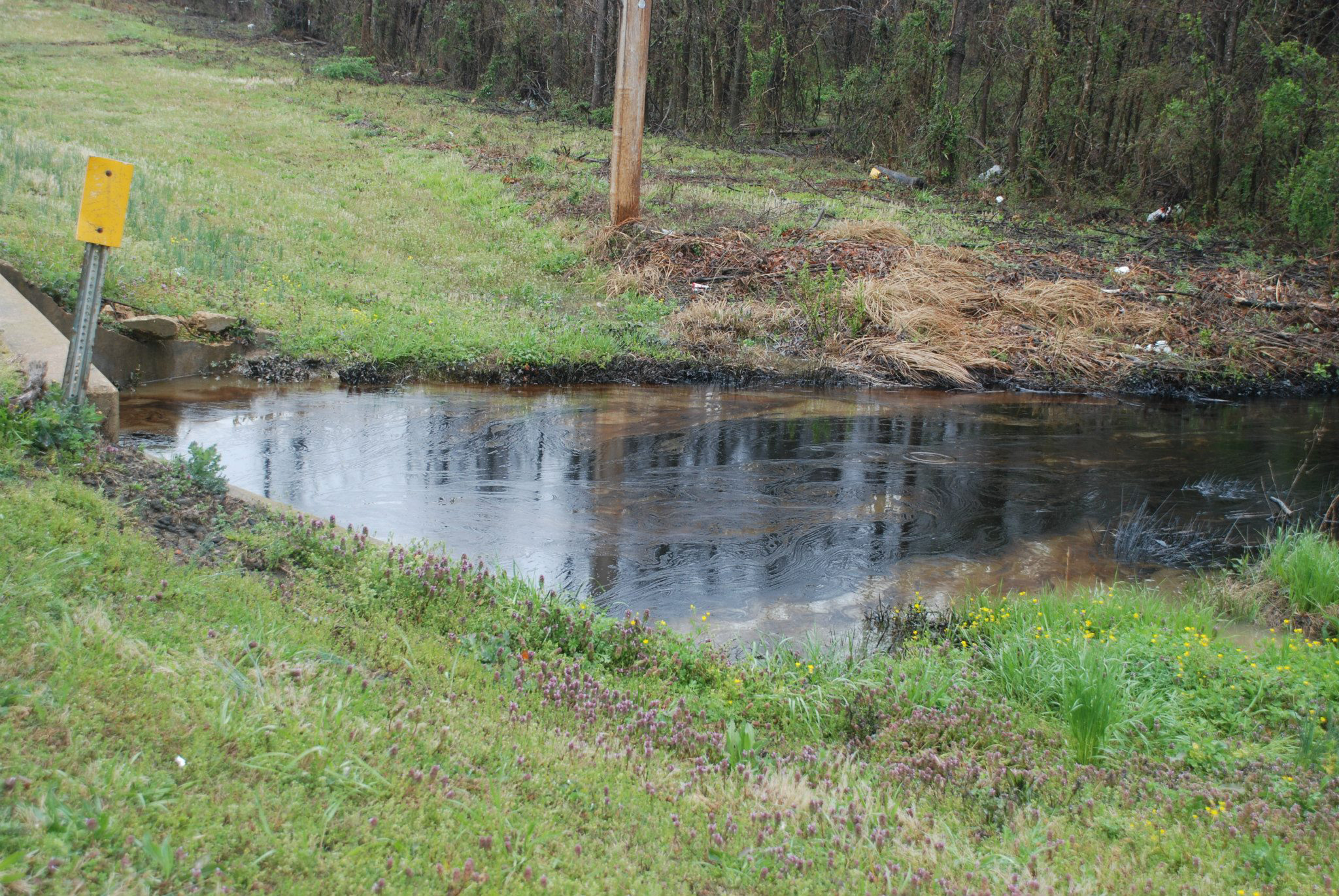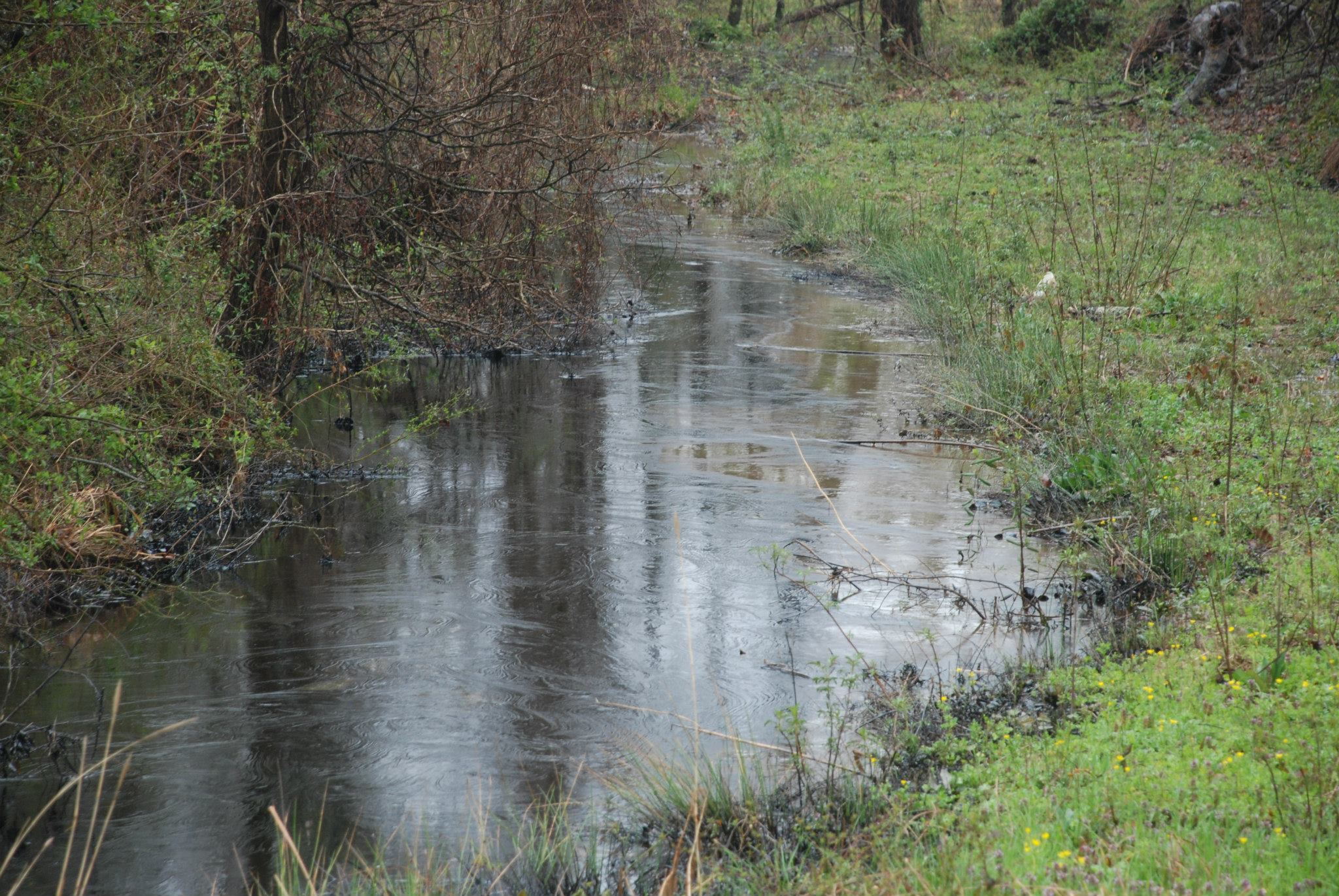Arkansas's Oil Pipeline Disaster
Air Date: Week of April 5, 2013

(Mayflower, Arkansas oil spill facebook page)
A pipeline that links Canada's tar sands with the Gulf coast ruptured in the rural community of Mayflower, Arkansas. Host Steve Curwood talks to Mayflower resident Becky Naylor about the spill and the clean up effort.
Transcript
CURWOOD: From the Jennifer and Ted Stanley Studios in Boston, this is Living on Earth. I’m Steve Curwood.
Oil spill. Exxon. Those words seem to be from a movie that we’ve seen before. And this time, the small rural town of Mayflower, Arkansas is playing an unwelcome leading role. Mobil built the Pegasus Pipeline sixty-five years ago to bring crude north from Port Arthur on the Gulf Coast to a refinery in Illinois. Seven years ago, Exxon Mobil won approval from the government to reverse that flow and link up with pipelines owned by Enbridge and the Koch brothers to carry Canadian tar sands crude south.
We will have more on the controversy over the economics and safety of pipelines later in the broadcast, but first let’s go to Mayflower, a little town 20 odd miles north of Little Rock where the Exxon pipeline ruptured and dumped thousands of gallons of the sticky crude into its creeks and on its lawns. Becky Naylor is a local resident of this town of 2,000 and works in a garden shop. Welcome to the program.
NAYLOR: Thank you.
CURWOOD: So how long have you lived in Mayflower?
NAYLOR: I’m a lifetime resident. We’re seven generations in this community. I’m 57 years old and was brought home from the hospital here. I’ve been here everyday since, never lived anywhere else. I have seven sisters and three brother, and we all live here in this one community.
CURWOOD: What’s the first you ever heard of this pipeline through your community?
NAYLOR: My husband’s land that we live on, they’ve had that for over 100 years in the family, and that pipeline come through during his grandfather’s time, when he was alive. It runs across the backside of our property where it blowed up at was about 500 feet, maybe more, right behind us and off to an angle.
CURWOOD: Oh, what does it look like?
NAYLOR: It looks like black mud. It’s horrible. The smell is horrendous. Now the smell has gone down a lot since they’ve cleaned and gotten it out of there. But on the days it’s not raining and it gets a little warm, it would almost take your breath away.

(Mayflower, Arkansas oil spill facebook page)
CURWOOD: When did you first know something had gone wrong?
NAYLOR: Well, that afternoon, we heard lots of sirens. And of course being a small town, everybody wants to know what all the sirens are about. And then we started getting phone calls, each people...you know, everybody ran once they started calling one another, letting them know they had a break in the pipeline that runs through the back. So naturally, we went back and looked at our property and there was nothing back there but the smell.
CURWOOD: I imagine so. Now, what has the spill meant for the town of Mayflower so far?
NAYLOR: Well, it’s pulled us all together, and thank God for the people that are on our city council, our mayor and our county judge. They’re all from this area. They knew where the creek went, and where they come out at, and where they were heading toward the lake. And Jimmy Joe Johnson automatically told them, “hey, this is going to empty over here right by the side of the lake if we don’t get to it.” So in 10 minutes, they were dumping sand and gravel to block it, to keep it from going into Lake Conway.
CURWOOD: And that’s a big place where you can boat, fish, and I suppose hunt a little too?
NAYLOR: Oh, yes. It’s a wonderful lake to fish on. There’s bass, there’s crappie, catfish...a lot of bass fishermen go over there.
CURWOOD: So how’s this for the wildlife there?
NAYLOR: They have found a few things. I know they found some ducks that were covered in oil. They found some turtles. They found a big old muskrat and different things like that. But they have got them cleaned up.
CURWOOD: So, you’ve probably never been through this before.
NAYLOR: Oh, no. We’ve been through tornadoes, we’ve been through fires, we’ve been through a lot of things, but nothing like this right here. We’ve even had 100-year-floods we’ve had to deal with down on our farm that hasn’t been there for over 100 years and moving equipment and helping neighbors move their cattle and things. But this is something we’re not familiar with to know what to do.
CURWOOD: Just wondering if this experience has you thinking all this movement of oil and risks of pipelines because we are so dependent on oil.
NAYLOR: Well, it does make you stop and think, but we spoilt ourselves to our vehicles needing oil and gas...and it’s something we’re going to have to check into to make it safer. That’s what I’m going to leave to my people I elect into office to take care of. But it’s something we’re going to have to have and we’re going to have to live with. There is some sacrifice for those privileges we have.
CURWOOD: Becky Naylor is a lifetime resident of Mayflower, Arkansas. Thank you so much, Becky!
NAYLOR: Thank you. You all keep us in your prayers, OK?
CURWOOD: We will. And likewise.
NAYLOR: Thank you.
Links
Living on Earth wants to hear from you!
Living on Earth
62 Calef Highway, Suite 212
Lee, NH 03861
Telephone: 617-287-4121
E-mail: comments@loe.org
Newsletter [Click here]
Donate to Living on Earth!
Living on Earth is an independent media program and relies entirely on contributions from listeners and institutions supporting public service. Please donate now to preserve an independent environmental voice.
NewsletterLiving on Earth offers a weekly delivery of the show's rundown to your mailbox. Sign up for our newsletter today!
 Sailors For The Sea: Be the change you want to sea.
Sailors For The Sea: Be the change you want to sea.
 The Grantham Foundation for the Protection of the Environment: Committed to protecting and improving the health of the global environment.
The Grantham Foundation for the Protection of the Environment: Committed to protecting and improving the health of the global environment.
 Contribute to Living on Earth and receive, as our gift to you, an archival print of one of Mark Seth Lender's extraordinary wildlife photographs. Follow the link to see Mark's current collection of photographs.
Contribute to Living on Earth and receive, as our gift to you, an archival print of one of Mark Seth Lender's extraordinary wildlife photographs. Follow the link to see Mark's current collection of photographs.
 Buy a signed copy of Mark Seth Lender's book Smeagull the Seagull & support Living on Earth
Buy a signed copy of Mark Seth Lender's book Smeagull the Seagull & support Living on Earth

